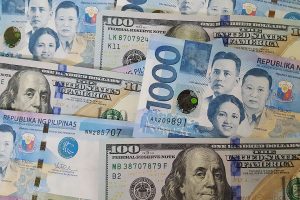Peso weakens anew vs dollar amid escalating Russia-Ukraine conflict
THE PESO depreciated anew against the dollar on Monday amid the worsening conflict between Russia and Ukraine. The local unit closed at P58.99 per dollar on Monday, weakening by 12 centavos from its P58.87 finish on Friday, Bankers Association of the Philippines data showed. The peso opened Monday’s session slightly stronger at P58.85 against the […]

THE PESO depreciated anew against the dollar on Monday amid the worsening conflict between Russia and Ukraine.
The local unit closed at P58.99 per dollar on Monday, weakening by 12 centavos from its P58.87 finish on Friday, Bankers Association of the Philippines data showed.
The peso opened Monday’s session slightly stronger at P58.85 against the dollar. Its intraday best was at P58.80, while its worst showing was its record low of P59 versus the greenback.
The local unit had closed at the P59-per-dollar level on Thursday to match the all-time low last hit on Oct. 17, 2022 before rebounding on Friday.
Dollars traded declined to $1.06 billion on Monday from $1.07 billion on Friday.
“The US dollar/peso exchange rate was higher recently amid some geopolitical risks related to the Russia-Ukraine war since last week on the potential escalation of the conflict,” Rizal Commercial Banking Corp. Chief Economist Michael L. Ricafort said in a Viber message.
“Going forward, the performance of the peso would be partly a function of intervention as consistently seen over the past two years, amid the need to better manage inflation and inflation expectations to fulfill the price stability mandate that would also require stability in the peso exchange rate,” Mr. Ricafort added.
The peso declined versus the dollar on expectations of potential strong US economic reports due later this week, a trader said in an e-mail. October US personal consumption expenditures data will be released on Nov. 27 (Wednesday).
For Tuesday, both the trader and Mr. Ricafort expect the peso to range from P58.80 to P59 versus the dollar.
“Lingering pressures on the greenback and profit-takers might keep the local currency sideways,” the trader said.
Russian forces attacked energy infrastructure in Ukraine’s southern region of Mykolaiv and industrial facilities in the southeastern Zaporizhzhia region overnight, Ukrainian authorities said on Monday, Reuters reported.
Engineers had restored power to most of the consumers facing power cuts in the attack’s aftermath as of the morning, Mykolaiv governor Vitaliy Kim said via the Telegram messaging app.
The governor reported no casualties and said the air defense downed two drones over the region.
Russia also launched “tens of drones” to attack Zaporizhzhia overnight, regional governor Ivan Fedorov said on national television.
Ukrainian President Volodymyr Zelensky said on Sunday that Russia used around 460 drones and over 20 missiles to attack Ukraine in the past week.
Meanwhile, the dollar relinquished a little of its recent gains on Monday as the pick for US Treasury secretary seemed to reassure the bond market and pulled yields lower, shaving some of the currency’s rate advantage.
Yields on 10-year Treasuries slipped to 4.351%, from 4.412% late Friday, as President-elect Donald Trump’s choice of fund manager Scott Bessent was welcomed by the bond market as an old Wall Street hand and a fiscal conservative.
However, Mr. Bessent has also been openly in favor of a strong dollar and has supported tariffs, suggesting any pullback in the currency might be fleeting.
The dollar was likely due some consolidation having risen for eight weeks in a row for only the third time this century and many technical indicators were flashing overbought.
The index was last down 0.5% at 106.950, having hit a two-year peak of 108.090 on Friday. The dollar dipped 0.4% on the Japanese yen to 154.11, and further away from its recent peak of 156.76. — Luisa Maria Jacinta C. Jocson with Reuters
















